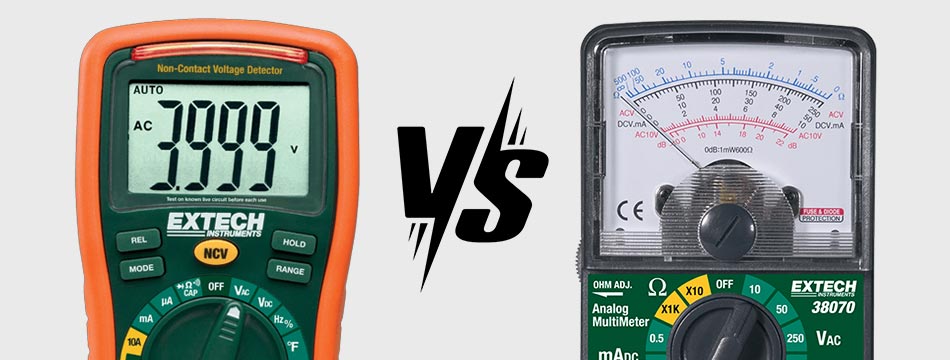
Please note this blog was originally published on the 22nd October 2012. It was updated on the 13th May 2021.
If you’re debating buying a multimeter, you may be struggling to decide which one is right for you. There are many models out there from different manufacturers, but one of the most important things you have to consider when buying a multimeter is one simple question:
Digital or Analogue?
Both digital and analogue multimeters function as great tools for measuring electrical current, voltage, and resistance, but are either of these instruments truly better than the other, and which is better suited to prolonged use?
Quick Links
- What's the Difference?
- Digital Popularity
- Electricity Fluctuations
- Multimeter Scale
- Digital Special Features
- Which Is Better?
- Further Information
What's the Difference?
The basic difference between an analogue and a digital multimeter is quite simple...
One is digital - it will display numbers on a digital screen. An analogue multimeter doesn't display numbers on a screen but instead uses a needle scale to show how readings are changing over time.
Digital Popularity
As technology has advanced, so has the multimeter. What started as a simple instrument with a needle scale, which was quite difficult to read, has advanced into the digital multimeter: an instrument that showcases test results accurately on an LCD display. This eliminates the guesswork of carrying out testing and allows electricians to see, clearly, the accurate result they need rather than a fluctuating result on a scale. Since digital multimeters are generally more accurate than their analogue counterparts, this has led to the increased popularity of digital multimeters, while the demand for analogue multimeters has declined.
On the other hand, digital multimeters are generally much more expensive than analogue versions. If you have more money to spend and need highly accurate results, then digital seems like it makes the most sense – but, remember this, despite not being as accurate, analogue multimeters can still give a reasonable test reading and generally retail for significantly less than digital models.
Electricity Fluctuations
When electricity flows it changes. The current can suddenly fluctuate at any moment, meaning the first, initial reading gained by a digital multimeter may not be an accurate representation of the electricity currently passing through it.
In comparison, an analogue multimeter, thanks to having a changing display, can accurately showcase sudden fluctuations that are taking place within the electrical flow. It won’t provide an exact reading, like the one you get on a digital multimeter, but the analogue instrument will give you an instantaneous, rough measurement of any sudden fluctuations and will alert you to potential problems with the electricity flow.
Multimeter Scale
In this instance, digital multimeters win hands down. An analogue multimeter has a fluctuating scale built into it, but it is up to the user to set this scale correctly and make sure the results gained are accurate. This can often lead to the wrong scale being set, and, subsequently, inaccurate readings.
In comparison, a digital multimeter automatically sets the scale for you and will tell you the scale on the built-in screen.
Digital Special Features
The humble analogue multimeter simply does what it is meant to do. If that’s all you need it for, then great. However, you should know that digital multimeters can generally perform tasks outside of their abilities to measure current, voltage, and resistance. For example, many units can measure temperature using type-K thermocouples, some can measure power levels, and most include additional functions such as true RMS (enhances accuracy when testing AC), data hold (freezes value on the screen), auto/manual ranging, and much more.
Which Is Better?
In terms of features, readings, and ease of use, the digital multimeter wins the race.
That said, analogue multimeters still have their merits, and are worth considering if you need a cheaper multimeter solution.
Further Information
If you require more help and advice regarding digital and analogue multimeters, please don't hesitate to contact our Sales team on 01642 931 329 or via our online form.
In the meantime, please browse our range of digital and analogue multimeters:


